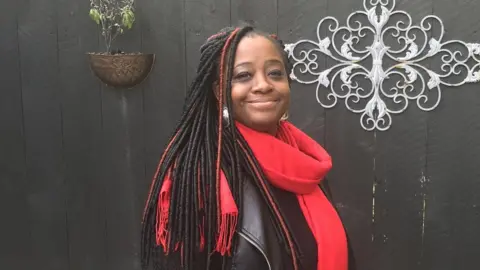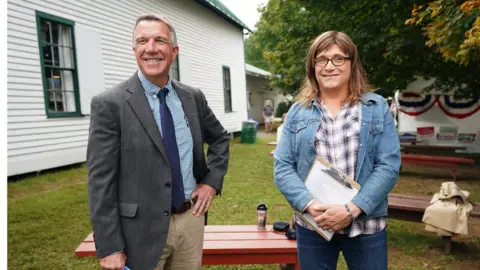Kiah Morris: Vermont's only black woman lawmaker on why she quit
 BBC
BBCKiah Morris, the only black woman in the Vermont legislature, shocked the US state when she resigned last month, citing ongoing racial harassment. Even in one of the most progressive states in America, she says white supremacy and a toxic political discourse are serious, unacknowledged problems.
Kiah Morris was puzzled. Why did friends on social media keep sending her links to a Saturday Night Live comedy video? Then she watched it.
In the sketch, which aired the last weekend of September, a group of Southern neo-Confederates discuss resettling in place with "no immigrants and no minorities - an agrarian community where everyone lives in harmony because every single person is white".
One member, played by actor Adam Driver, raises his hand.
"Yeah, I know that place," he says. "That sounds like Vermont."
The studio audience laughs as the Vermont jokes continue, but for Ms Morris the lines had a bite.
"It was funny," she says. "But it was sad."
In 2014 Ms Morris became only the second black female member ever elected to the Vermont state legislature. Four years later, in the midst of a re-election race, she resigned from public office after repeatedly being the target of racial harassment.
She received death threats. Her property was vandalised. She found swastikas painted on the trees near her house.
She obtained a restraining order against a repeat online harasser, but the threats continued.
For Ms Morris, racism in Vermont - long considered a bastion of liberal values - was no joke.
"There were individuals in the community and throughout the state that we were finding were parts of white supremacist groups," she says. "Because we were so progressive and because we have been working so hard on so many issues of equality, we just sort of fell asleep and didn't pay attention to that."
 Getty Images
Getty ImagesThe 42-year-old Morris, who grew up in Chicago, came to Vermont over a decade ago. She says she initially had no interest in running for public office, but friends and mentors changed her mind. She enrolled in Emerge America, an organisation that recruits and trains female Democratic candidates, and put her name on the ballot in the southern Vermont town of Bennington.
"I really learned what it meant to be out there and to represent and how you can truly be this voice for the people that you are representing and bring an opportunity to bring change in a way that I couldn't do locally," she says.
As she began her campaign, however, it became very clear that her ethnicity - in a state that is 95% white and 1.2% black - was going to be an issue.
"We received online threats," she says. "We received hateful messages. We had things happen at our home. We had a break-in while we were asleep."
She adds that she wasn't the only member of a minority in the state to experience such harassment - and she says it's only got worse since Donald Trump's victory in the highly contentious 2016 presidential race.
"It brought about a complete destruction of anything that we want to call political discourse and moved into an area where the fears and the anger and the sadness and the hurt that people were feeling throughout the nation came forth and came out of their mouths and into our lives," she says.

More on race in America

During her four years in office Ms Morris says she helped push legislation extending free contraceptive coverage to all Vermonters, control pollution and address racial and income disparities in the education and the criminal justice systems.
It was her support for a comprehensive gun control bill, however - passed in April 2018 - that brought the harassment and threats to an intolerable level. She says opponents of the gun law, which strengthened background checks and banned large magazines and bump stocks, cited her as the "voice and face" of out-of-state efforts that they said would eventually lead to firearm confiscation.
"It did not escape my attention that that type of behaviour, doing that type of a clarion call, could get me killed," she says. "It was solely directed at me, as the black woman."
So in August Ms Morris, after winning the Democratic primary, decided to abandon her re-election bid. When that didn't stop the harassment, she resigned from the legislature, effective immediately.
She said her son and her husband, who had just undergone heart surgery, needed her and that she had given the state all she could. She returned to her job with Tesa Collective, which makes games and tools for progressive organisations, and planned to do more writing.
Ms Morris says friends and colleagues tried to convince her to change her mind. After her announcement, Vermont Governor Phil Scott, a Republican, offered to support her re-election, warning that her resignation would allow the forces of hate to win.
That, according to Ms Morris, is victim-blaming.
"The systems need to change to support individuals in office so that they do not have to live in fear and terror," she says. "These are incredibly violent times, and I do not feel any need to martyr myself or my family."
It can't fall on her, she says - or on any one person - to try to fix a broken system. It takes a "chorus of people".
"They win when you leave it up to a movement messiah to be the one to move the work forward," Ms Morris says. "They win when you place it squarely on my shoulders as somehow this emblematic person.
"The change has to happen from each and every one of us because the work is that enormous. It cannot be an ask and it is wrong to ask anyone to place themselves in that type of a circumstance.
"So I win because I chose to take my life back."
